Edie Melson's Blog, page 195
July 5, 2020
A Gifted Steward

by Ralene Burke @RaleneB
As each one has received a gift, minister it to one another, as good stewards of the manifold grace of God. 1 Peter 4:10
Many of my novels deal with God using ordinary people in extraordinary ways. I believe that many people sell themselves short—or rather sell God short. God freely gives us what we need to follow the path He has laid before us.
Each person is given a gift to minister to the whole of God’s people. This is not meant to be a controversial statement about spiritual gifts, but simply a fact. No matter who we are, when we become believers, at the very least we are called to serve as Jesus served. We’re given the capacity for compassion and to serve those around us.
And each person is a steward of that gift. A steward is a manager or trustee of something. In most cases, it is someone in charge of management and provision for a large household. These people had access to (some of) their employer’s money, and they had their employer’s trust to run the household efficiently. And so we are expected to do the same with the gifts God gives us.
Like in the parable of the faithful servant, when we use our gift(s) to God’s glory, we are rewarded with more of the gift. Using our gift is much like using a muscle. When we use a muscle regularly, we build it up, make it stronger. But when we don’t, it becomes flaccid and useless. Our gifts work the same way.
Be not afraid of the gifts God has given you. He has a plan and purpose for everything. It may not seem safe or comfortable, but hey, we weren’t guaranteed a safe and comfortable life. In fact, Jesus tells us we will NOT be safe or comfortable. We will be persecuted. People will not like us. Still, God calls us. And whatever you do, do it heartily, as to the Lord and not to men. Col. 3:23
God has given me the gift of writing, and it is my honor and duty to use that to bring glory to Him. The more I leave up to God, the more I’m excited to see where He takes me on this journey. As much as I hope that readers benefit from my stories in many ways, I find that I am the one that learns so much more.
TWEETABLEA Gifted Steward - @RaleneB on @EdieMelson (Click to Tweet)
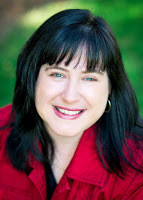 Whether she’s wielding a fantasy writer’s pen, a social media wand, or a freelance editor’s sword, Ralene Burke always has her head in some dreamer’s world. And her goal is to help everyone #SHINE Beyond their circumstances! Her novels, Bellanok and Armor of Aletheia, are available on Amazon. More fantasy novels coming soon!
Whether she’s wielding a fantasy writer’s pen, a social media wand, or a freelance editor’s sword, Ralene Burke always has her head in some dreamer’s world. And her goal is to help everyone #SHINE Beyond their circumstances! Her novels, Bellanok and Armor of Aletheia, are available on Amazon. More fantasy novels coming soon!When her head’s not in the publishing world, she is wife to a veteran and homeschooling mama to their three kids. Her Pinterest board would have you believe she is a master chef, excellent seamstress, and all-around crafty diva. If she only had the time . . . You can also find her on Facebook, Instagram, Twitter, or at her website.
Published on July 05, 2020 22:00
July 4, 2020
Are You Cultivating Creativity or Crowding it Out of Your Life?
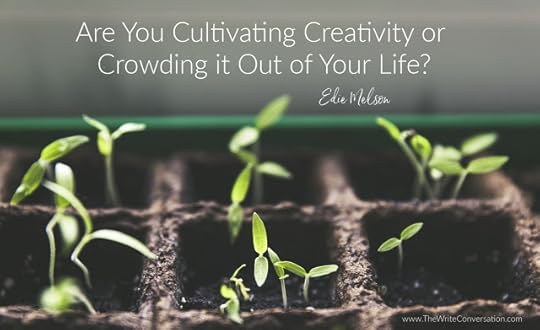
By Edie Melson @EdieMelson
But all things must be done properly and in an orderly manner. I Corinthians 14:40
Summer is here and every weekend we can visit the farmer's market for fresh produce. As I walked through the stalls recently, I was drawn back to one summer when I decided to try my hand at gardening.
But we were optimistic, and so we began. We used an old tiller, plowed up a small bit of ground, and planted a variety of seeds. One of the vegetables I was most looking forward to eating fresh out of the garden was carrots. When it came time to plant the carrots, I was amazed at how tiny the dark seeds were in the palm of my hand. I remembered the man at the garden center warning us to plant the seeds sparingly, but the seeds were so small, and I really wanted a large crop of carrots. So I sprinkled them thickly in the ground. After all, I figured, if a few were good, more would be better.
Those of you who are expert gardeners are already laughing because you know what happened. I think every single one of those tiny seeds took root and sprouted. As they grew, in a few short weeks they became a tangled mess, fighting for nutrients and space. Then, after lifting a couple of inches of green toward the sun, every single one of those carrots withered and died. I was left with nothing more than the bitter taste of disappointment and discouragement.
As this memory resurfaced, I found myself asking God why it had come to mind. I realize that I’d been looking at my calendar and I heard God warning me, once again, that my life was becoming crowded by saying yes to too many things. He was warning me to plant fewer seeds and take time to nurture them. Otherwise I’d find myself with an empty garden, with nothing but withered endeavors from pouring too many good things into my life.
So I ask you, how is your garden? Is it well-ordered and taken care of? Or, in your desire too accomplish much, are you also crowding out any hope of reaping a harvest?
TWEETABLE
Are you cultivating creativity or crowding it out of your life? - @EdieMelson (Click to Tweet)
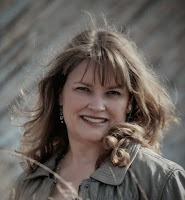 Edie Melson is a woman of faith with ink-stained fingers observing life through the lens of her camera. No matter whether she’s talking to writers, entrepreneurs, or readers, her first advice is always “Find your voice, live your story.” As an author, blogger, and speaker she’s encouraged and challenged audiences across the country and around the world. Her numerous books reflect her passion to help others develop the strength of their God-given gifts and apply them to their lives.Connect with her on her website, through Facebook, Twitter and on Instagram.
Edie Melson is a woman of faith with ink-stained fingers observing life through the lens of her camera. No matter whether she’s talking to writers, entrepreneurs, or readers, her first advice is always “Find your voice, live your story.” As an author, blogger, and speaker she’s encouraged and challenged audiences across the country and around the world. Her numerous books reflect her passion to help others develop the strength of their God-given gifts and apply them to their lives.Connect with her on her website, through Facebook, Twitter and on Instagram.
Published on July 04, 2020 22:00
July 3, 2020
Celebrate Our Freedom
Published on July 03, 2020 22:00
July 2, 2020
How To Make a Connection
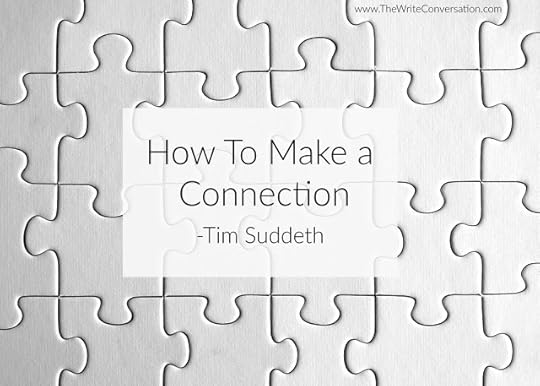
by Tim Suddeth @TimSuddeth
Have you ever tried to have a conversation with someone and it was as if you were speaking two different languages? You knew they understood the words, but the two of you just weren’t connecting.
That is what I found in Charles R. Swindoll’s book, Saying It Well. I’ve never met him, but I feel like I know him because for years I’ve listened to his radio program, Insight for Living.Now, don’t leave me just because you’re “not a pastor so what can I learn from him.” Who better to listen to than someone who had to present a new and unique talk each week for decades, to the same group, and yet make it fresh and keep them awake?
Now, most of us are not pastors. We aren’t speaking to large groups several times every week. But if you’re reading this blog, you probably are trying to share a message in some way, either spoken or written.
I found some key tips in the book to help us connect with our audiences, whether it’s one person or thousands. He introduces the book with one of the most important mindsets a speaker/writer needs. Be Yourself.
That sounds so simple yet it can be so hard. Isn’t one of the reasons we want to speak or write is because there was someone we’ve enjoyed who really touched us? When I felt called into church work, I told God I couldn’t be like our pastor, a very charismatic, personable leader. God made it clear that He knew that. He didn’t call me to be a clone of our minister. He called me to be myself. The one for whom He’d made a special plan.
Dr. Swindoll gave three insights he has shared over the years to help: Know who you are.Accept who you are.Be who you are.
We saw that where God called Moses to lead the Israelites out of Egypt. Moses knew who he was, but he had trouble accepting God could and would use him. He had all kinds of excuses why he couldn’t return to Egypt and lead his people. God knew all those already. He didn’t need Moses, however He wanted to work through him.
He gives us that same type of opportunity to let the universal Creator use each of us as His special tool. What an honor. It would be terrible to miss it out on knowing God’s presence and power because we are afraid.
Another lesson I noticed was: Don’t mail it in. Even on the days, weeks, when you don’t feel great, and life drops a boulder on you. You don’t know who you may reach who needed to hear your message. Put in the preparation and do your best.
The flip side of that is give yourself some grace. Sometimes you aren’t going to be at your best. Dr. Swindoll wrote about preaching one Sunday after getting some devastating news about his daughter. She had been in a horrible car accident the previous week and they thought she might be paralyzed. After such an emotional time, he had nothing to give and he said it showed, he was tired and felt lifeless. Yet it was one of his more popular sermons from all the responses and request for tapes. Sometimes we can be our own worst critic.
When he looked back at that sermon, though he never mentioned his daughter’s situation in it, the struggles his family were going through had influenced the whole message. This difference in this message from others was something we need to try to show in our own work. Be Authentic. In his talk, he had shown how God was using the topic of his message to work in his own life. People were easier to tune into it more easily.
People want to be talked to, not at. When we look back at a story or a presentation that really touched us, most of the time it wasn’t only what was said that lingers. We feel like we got to know the writer/speaker a little more.
There’s one last point that he made that I think is so important: Focus on the audience. Sometimes we get so caught up in what we want to say, we forget about who we’re trying to reach. How can you help the audience best accept and understand your message?
Dr. Swindoll gave an example of how some of the professors he’d spoken with couldn’t understand why their books hadn’t sold better. When you read the books, you can see that they wrote for other professors like themselves, using the jargon and illustrations that they found familiar. They didn’t write in a way that would connect with their hopeful audience.
Saying It Well gives us a lifetime of experience and knowledge from someone who has touched countless lives over many years, including my own life. When I listened to him, I felt like I wasn’t just listening to a dry lecture, but I was listening to someone who had gone through what I had and understood. Isn’t that how we want to come across?
What speaker or writer really connected with you and why did the connection work? I’d love to hear about it in the comments.
TWEETABLEHow To Make a Connection - @TimSuddeth on @EdieMelson (Click to Tweet)
 Tim Suddeth is a stay-at-home dad and butler for his wonderful, adult son with autism. He has written numerous blogs posts, short stories, and three novels waiting for publication. He is a frequent attendee at writers’ conferences, including the Blue Ridge Mountain Christian Writers Conference and a member of Word Weavers and ACFW. He lives near Greenville, SC where he shares a house with a bossy Shorky and three too-curious Persians. You can find him on Facebook, Twitter, or at timingreenville.com.
Tim Suddeth is a stay-at-home dad and butler for his wonderful, adult son with autism. He has written numerous blogs posts, short stories, and three novels waiting for publication. He is a frequent attendee at writers’ conferences, including the Blue Ridge Mountain Christian Writers Conference and a member of Word Weavers and ACFW. He lives near Greenville, SC where he shares a house with a bossy Shorky and three too-curious Persians. You can find him on Facebook, Twitter, or at timingreenville.com.
Published on July 02, 2020 22:00
July 1, 2020
A Writer's Biggest Fan

by Lynn H. Blackburn @LynnHBlackburn
I never dreamed that we would be one of “those” families—the kind whose kids have sports almost every night of the week. But then I had boys and they turned into ballplayers. Flag football, basketball, baseball. They can’t get enough.And the truth is, neither can I.
The squeak of rubber soles on a gym floor. The swish when the ball slides through the net.
The crack of the bat. The satisfying thunk when the ball lands in the glove.
I love all of it.
I’m a fan of sports in general, but it’s an entirely different ballgame when it’s my child on the field.
I love watching my boys do something they love. The intensity on their faces as they drive the ball up the court. The focused concentration as they watch the ball into their glove. The pure joy when they make a catch, hit a home run, or sink the winning shot.
And I’m not a passive observer. While I’m normally reserved, there’s an entirely different side of me that emerges when my kids are playing. (Or, to be honest, when Clemson plays, but that’s a story for another day). I’m that mom who jumps out of my seat and cheers at full volume. I yell encouragement and scream with joy when the play unfolds perfectly.
A few weeks ago I was watching one of my sons play, and I had a mom moment. I can’t remember the specifics—I think my son made a great catch—and I found myself blinking back tears. I couldn’t get a handle on why I was so happy. It’s a baseball game, I reminded myself. Just a game.
But . . .
That’s my son out there doing something he loves. He’s good at it. He plays his heart out and it brings him joy. And because of that, it brings me joy.
And then I had a writer moment.
I didn’t hear an audible voice. It was more of an impression, a thought, a picture. I realized that when I’m sitting at my desk writing, or brainstorming with my friends, or teaching a class, or encouraging a fellow writer, God sees. When I’m doing this thing that I love, God is right there. And here’s the part that blew me away.
God loves all of it.
Can you picture it with me? God is present, listening to the quiet clicking of computer keys or the soft scrape of pen on paper. He’s there in the noisy restaurants (if we ever get to back to them), the coffee shops, the conference sessions. He’s watching as minds are tuned toward stories and plots and “a-ha” moments flicker through the room like fireflies. He’s reading over our shoulder as we send the late night texts and He’s listening in on the phone conversations as the children He has called to write work through their fears and insecurities.
He sees us when we hit send on the query letter, the manuscript, the blog post.
He’s watching us do this thing we love and I believe it brings Him joy.
I know we tend to think of God as serious and somber. He is God after all. And in no way would I diminish His holiness or majesty or glory. But this is the same God who says in Zephaniah that He will rejoice over you with gladness; He will quiet you by his love; He will exult over you with loud singing.
That doesn’t sound like God is sitting quietly, fingers steepled, giving a slight nod of encouragement, now does it? No. When I read that, I imagine God leaning forward, maybe even holding His breath, watching for the moment when all the pieces click, and when they do, He lets out a holy whoop of joy.
So today, tonight, tomorrow, the next time you sit down to write, take a second and picture the arena. Imagine that you’re on the field and God is watching from the stands. He’s not there as umpire or referee, ready to penalize any missteps. He’s there as Father. As the One who made you and loves you like no one else ever has or ever will, and He’s cheering you on.
Then write your heart out for Him.
Grace and peace,

TWEETABLEA Writer's Biggest Fan - @LynnHBlackburn on @EdieMelson (Click to Tweet)
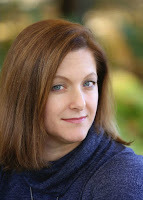 Lynn H. Blackburn loves writing suspense because her childhood fantasy was to become a spy, but her grown-up reality is that she's a huge chicken and would have been caught on her first mission. She prefers to live vicariously through her characters and loves putting them into all kinds of terrifying situations while she's sitting at home safe and sound in her pajamas!
Lynn H. Blackburn loves writing suspense because her childhood fantasy was to become a spy, but her grown-up reality is that she's a huge chicken and would have been caught on her first mission. She prefers to live vicariously through her characters and loves putting them into all kinds of terrifying situations while she's sitting at home safe and sound in her pajamas! Her Dive Team Investigations series kicked off in 2018 with Beneath the Surface and In Too Deep (A SIBA Okra pick and Selah Award Finalist). The 3rd book in the series, One Final Breath, released September 2019 and is a 2020 Selah Award and a 2020 Faith Hope, and Love Reader’s Choice Award finalist. She is also the author of Hidden Legacy and Covert Justice, which won the 2016 Carol Award for Short Novel and the 2016 Selah Award for Mystery and Suspense. Lynn lives in South Carolina with her true love and their three children. You can follow her real life happily ever after at LynnHBlackburn.com and @LynnHBlackburn on Bookbub, Facebook, Twitter, Pinterest, and Instagram.
Published on July 01, 2020 22:00
June 30, 2020
Tell Your Story — Transform Your Life: Journaling Tips for Writers

by Sarah Sally Hamer @SarahSallyHamer
Journaling is an amazing tool. Since most journals are a private conversation with ourselves, never to be shown to anyone else, they can allow us to open up the memory bank of the past and find the wounds hidden beneath the persona we wear. Author Henry Miller admitted that writing helped him to draw "the poison" out of his system.Isn’t that what we want? To get the poison out? To dig down to the deep, dark secrets which control us and prevent us from finding happiness?
Those secrets could be about any stressful experience – a divorce, a rape, an unsafe household, an abusive relationship, a natural disaster. All of these and more can cause trauma. But keeping it secret seems to be even worse than the original trauma. In fact, psychologist James Pennebaker learned that, for journaling to work, we must "really let go" as we journal.
But there are some guidelines:()This exercise is about expressive writing, in that writing without emotion isn’t helpful at all. Instead, the expectation is that you will choose a subject close to your heart and allow yourself to FEEL emotion as you write. This is the most difficult part, since we tend to avoid deep emotion because it hurts. But without feeling, words don’t mean anything.Write without editing. Let the words flow. Feel the sorrow or pain or embarrassment and write it down. Cry if you must. But let the words on the page draw out “the poison”. Recognize that, even though it may hurt, the wounds of the past need to be opened and cleaned, so they can heal. Pick an experience if you can. If there isn't a single experience, try to find something that resonates with you. There could be a thousand tiny pieces of that puzzle, all adding up to unhappiness.To start, find a quiet, peaceful place, somewhere you feel safe and comfortable. Set a timer and write. Don’t edit. Don’t worry what someone else will think. Don’t allow yourself to be dragged down into the abyss. Just let whatever comes come.
When you’re done—after at least fifteen minutes—ask yourself these questions:Did you express your deepest thoughts and feelings? Do you feel sad or upset? Or happy?Did you write something valuable and meaningful?
Follow this procedure for at least seven days. And, remember, you do not have to share anything you discover about yourself with anyone.
As we work through the revelations of our daily writing, we must keep in mind that we should not be in a hurry to “fix” anything. It’s not just about space to write. It’s about allowing a space and time for the understanding to come.
This process of this self-reconciliation is not just a one-time occurrence, done in a few moments of time, plugged into a busy schedule. Instead, it is done over a lifetime, with hurtful/painful things surfacing for examination and healing. In fact, I liken it to the way the grieving process works. My husband died many years ago and, even now, I grieve. The idea that we “get over it”, that events don’t hold power over our emotions even after long years, is a fallacy. Pain is pain, no matter how recent or far ago in the past.
Do not let yourself become overwhelmed. If what you remember causes you pain, work through it only if you can. If it becomes too much, rest for a while—an hour, a day, a week—but don't allow yourself to walk away. This is too important. And, please, if you need to find help, do so. There are professionals who can walk you through the darkest hours.
I find that I don't need to write every day or even every week. Sometimes a particularly painful memory is triggered and I write for hours but, once I've dealt with it, I may not write again for weeks. But I know the value of the remembering and the dealing, so I go back to it when I need it.
Finding a place in your day for self-care is immensely important, and writing to heal is so beneficial, it may become a habit to keep.
TWEETABLETell Your Story — Transform Your Life - journaling tips for writers from @SarahSallyHamer on @EdieMelson (Click to Tweet)
 Sarah (Sally) Hamer is a lover of books, a teacher of writers, and a believer in a good story. Most of all, she is eternally fascinated by people and how they 'tick'. She’s passionate about helping people tell their own stories, whether through fiction or through memoir. Writing in many genres - mystery, science fiction, fantasy, romance, medieval history, non-fiction – she has won awards at both local and national levels, including two Golden Heart finals.
Sarah (Sally) Hamer is a lover of books, a teacher of writers, and a believer in a good story. Most of all, she is eternally fascinated by people and how they 'tick'. She’s passionate about helping people tell their own stories, whether through fiction or through memoir. Writing in many genres - mystery, science fiction, fantasy, romance, medieval history, non-fiction – she has won awards at both local and national levels, including two Golden Heart finals.A teacher of memoir, beginning and advanced creative fiction writing, and screenwriting at Louisiana State University in Shreveport for almost twenty years, she also teaches online for Margie Lawson at www.margielawson.com. Sally is a free-lance editor and book coach at Touch Not the Cat Books, with many of her students and clients becoming successful, award-winning authors.
You can find her at hamerse@bellsouth.net or www.sallyhamer.blogspot.com
From Sally: I wish to express gratitude to the giants whose shoulders I stand on and who taught me so much about the writing craft. I would list every one, if it were only possible.
Published on June 30, 2020 22:00
June 29, 2020
21 Best Twitter Practices for Writers
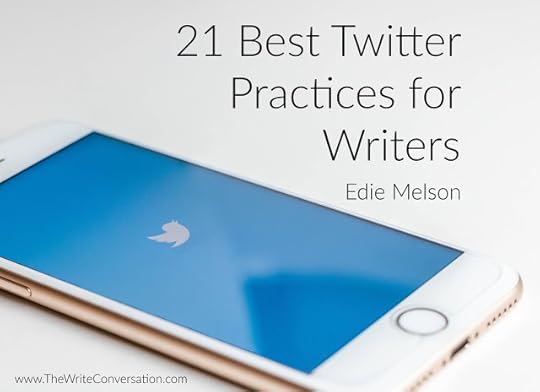
by Edie Melson @EdieMelson
There has been a huge change with Twitter recently—Tweets are no longer limited to only 140 characters. Instead you can use up to 280. The question is, should you?
Maybe...
There are other, less obvious, shifts in the Twitter universe as well. Those feed into how we should approach the length of our updates. Instead of length explanations, I’m going to share a list to help navigate this new paradigm.Best Practices for Twitter1. Make sure you’re Twitter bio is completely—and accurately filled out. This means including your website and a recognizable headshot for your profile picture.
2. DO NOT use an auto responder when someone follows you on Twitter. It irritates everyone and is almost universally considered a bad practice.
3. Update your header with a clearly branded high resolution image. Your twitter header is the long rectangle at the top of your Twitter home page. And remember your brand is bigger than a single book. Yes, include your most recent book, but remember one book isn’t your brand.
4. When you reply to someone else’s tweet, don’t include a link to your blog. (Yes, I’ve seen this done) Your blog link should be in your bio and if someone wishes to visit, they can find the link.
5. Learn how to use hashtags correctly. This means limiting yourself to two (maybe three) per tweet, and researching a hashtag before you use it. For instance, there are hashtags that are used primarily for chats. Using one of those hashtags to promote your book will get you lots of irritated attention.
6. Take time to use the robust search engine on Twitter for help. Unlike other social media networks, there’s a lot of valuable—easy to find—info on Twitter help. Get in the habit of searching there when you have questions.
7. Interact with those who interact with you. If someone makes a comment or answers a tweet you sent out, don’t ignore them. Also, if someone regularly retweets you or shares your posts, look for ways to do the same for them. Remember social media is reciprocal.
8. Along that same thought, follow people back who follow you. There are exceptions to this rule. I make it a point to NOT follow spammers or someone who makes me uncomfortable.
9. Don’t send a direct message to all your followers asking them to buy your book. This is actually a violation of Twitter’s Terms of Service (TOS). Everyone who follows you on Twitter is not your customer. Be smarter than that when it comes to marketing.
10. Use the new 280 character length strategically. Create a list, use more than one link to show a natural continuity. But be smart. If you can say it effectively in 140 characters, do so. Shorter is still better on Twitter.
11. Also take advantage of the ability to lengthen your DISPLAY name on Twitter. We all know that our user names cannot be longer than 15 characters, but now our display names came be up to 50 characters.
12. Don’t tag someone in a tweet unless it pertains to them directly. If you mention them in your current blog post, yes tag them. Otherwise, don’t. This is another violation of Twitter TOS.
13. Be sure your Twitter feed is populated with updates that are NOT about you. I recommend Edie’s 5 to 1 rule to keep it from appearing to be self-serving. For every 5 Twitter updates you share, only 1 is about you.
14. DO NOT ever buy Twitter followers. This is another practice that violates Twitter TOS. Twitter is serious about protecting those who follow the guidelines and is really cracking down on spam practices. Educate yourself and make sure you know what is and isn’t considered spam.
15. Always be on the lookout for new accounts to follow. You can do this by searching your followers, followers. We should never assume we’ve come to a place where our Twitter account will continue to grow automatically.
16. Listen to your instincts. If someone is making you uncomfortable on Twitter, mute or block that account. There are a lot of crazy people out there. Don’t waste time trying to be polite.
17. Vary your updates. Share a quote, ask or answer a question, put up a picture or a meme. Variety is the spice of life and will help your account grow faster.
18. Schedule and space out your updates. I use Hootsuite, but Buffer is also an excellent option to schedule your tweets.
19. Always include an image. There was a time when tweets were driven by the text. Now a text-only tweet gets lost.
20. Play nice. Google (and other search engines) cache Tweets, so even if you delete something it’s still available online. You’ll never regret being nice, but being rude or ugly can come back to haunt you years after the original update went out.
21. Add value, not noise. There is a lot of junk on social media. I try to make sure that the things I share make someone’s life better.
Twitter is still a power house on social media, as long as you use it correctly. Take time to learn the culture and then enjoy the interactions that this network will bring your way.
Now it’s your turn. I’d love to know what you’d add to many list of dos and don’ts for Twitter. Be sure to share your thoughts in the comments section below.
Don’t forget to join the conversationBlessings,Edie
TWEETABLES21 Best Twitter Practices for Writers - @EdieMelson (Click to Tweet)
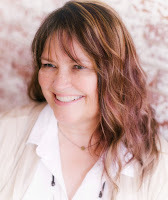 Edie Melson is a woman of faith with ink-stained fingers observing life through the lens of her camera. No matter whether she’s talking to writers, entrepreneurs, or readers, her first advice is always “Find your voice, live your story.” As an author, blogger, and speaker she’s encouraged and challenged audiences across the country and around the world. Her numerous books reflect her passion to help others develop the strength of their God-given gifts and apply them to their lives.Connect with her on her website, through Facebook, Twitter and on Instagram.
Edie Melson is a woman of faith with ink-stained fingers observing life through the lens of her camera. No matter whether she’s talking to writers, entrepreneurs, or readers, her first advice is always “Find your voice, live your story.” As an author, blogger, and speaker she’s encouraged and challenged audiences across the country and around the world. Her numerous books reflect her passion to help others develop the strength of their God-given gifts and apply them to their lives.Connect with her on her website, through Facebook, Twitter and on Instagram.
Published on June 29, 2020 22:00
June 28, 2020
Digital Self Care for Writers
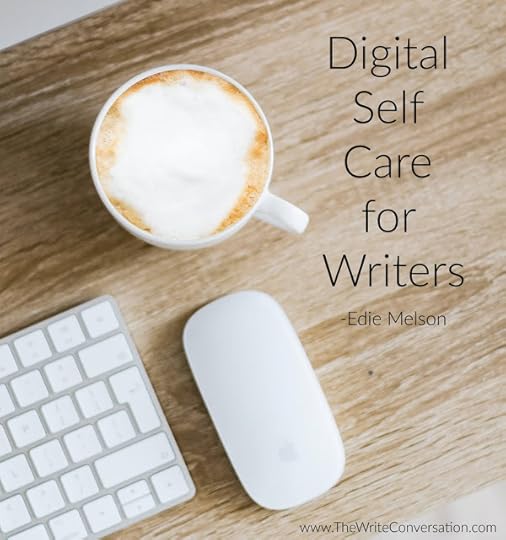
by Edie Melson @EdieMelson
The world has changed.
And the process has been exhausting.
Even when we come out the other side of this pandemic, life is going to look very different. I’m holding tight to the hope that it’s going to be better. But it’s hard for me to equate different and better because I’m not a fan of change.
But one thing I have learned is this:
We must learn to balance our digital lives as carefully as we balance our physical ones.
But now I'm exhausted. And I'm once again reminded that it’s really hard to get water from a dry well.
So now I'm going back to the lessons I've learned in recent years and I'm going to share them with you.
Here are some of the things that work for me:
Weekends off are now the norm, NOT the exception. I just function best on Monday, if I have Saturday and Sunday for rest and relaxation. That means little or no time on the computer on those days. I’ve learned that if it’s urgent I’ll get a text or a phone call. Everything else can wait. One other thing I’ve learned by taking weekends off—if I don’t, pretty soon EVERY day feels like Monday.Learn to limit digital meetings. It's tempting to schedule meeting after meeting to try to be productive. But online meetings are exhausting. They take a tole on us physically too. Zoom exhaustion is a real thing right now. Families come first. My good friend, Lynn Huggins Blackburn said it best. “Sometimes writers don’t write—they bake cookies.” I wouldn’t trade the years I had as mommy to three growing boys. No best-selling book in the world would have been worth passing up that time. The same comes with hanging out with my parents now. Time is limited, and I try to never forget that.Be aware of the pressure right now and make your own decisions. There is a lot going on in the world and we all feel the need to make a positive impact. But we need to weigh our options and decide how we want jump in and not just cave into outside pressure. Relationships matter, and beyond that, they need nurturing to survive. This goes beyond the obvious family relationships. I’m talking about friendships here. As I said early, the world has changed. But that's no excuse to isolate. I may have to work harder, but it's still important to spend time with the people I care about, I show them they are valued. Field trips are time well spent. I used to visit museums and bookstores, now I take long walks and search for places to spread my photography wings. Take time to explore the cool places nearby, you won’t regret it, I promise!It’s okay (even encouraged) to have hobbies that have NOTHING to do with writing and/or reading. Many of you know I love to take pictures. I also love to do crafty things like knit and journal. Beyond that, I have a group of craft-minded women that I meet with occasionally. We sit together and work on projects and creativity seems to just hang in the room. And none of these women are writers. But I always come away with a renewed enthusiasm for writing.Be gentle with yourself. I've been irritated with myself lately because I can't seem to control some of my emotions. I'm more prone to anger, tears, hopelessness, and over the top joy. I never know what's going to set me off and the lack of control frustrates me. Seek time apart with God. Right now so much of my daily schedule is in shreds. My sleep habits, eating habits, and even my regular time with God. But now more than ever I need regular time with God. Now it's your turn. What are you doing right now to take care of yourself digitally? Share your tips for renewing and relaxing in the comments section below. Who knows, some day we may once again be able to visit a museum together and have a cup of coffee!
Don’t forget to join the conversation!Blessings,Edie
TWEETABLES Digital Self Care for Writers - @EdieMelson (Click to Tweet)
 Edie Melson is a woman of faith with ink-stained fingers observing life through the lens of her camera. No matter whether she’s talking to writers, entrepreneurs, or readers, her first advice is always “Find your voice, live your story.” As an author, blogger, and speaker she’s encouraged and challenged audiences across the country and around the world. Her numerous books reflect her passion to help others develop the strength of their God-given gifts and apply them to their lives.Connect with her on her website, through Facebook, Twitter and on Instagram.
Edie Melson is a woman of faith with ink-stained fingers observing life through the lens of her camera. No matter whether she’s talking to writers, entrepreneurs, or readers, her first advice is always “Find your voice, live your story.” As an author, blogger, and speaker she’s encouraged and challenged audiences across the country and around the world. Her numerous books reflect her passion to help others develop the strength of their God-given gifts and apply them to their lives.Connect with her on her website, through Facebook, Twitter and on Instagram.
Published on June 28, 2020 22:00
June 27, 2020
The Perfect Flower and the Right Fit for Your Writing

by Edie Melson @EdieMelson
We are God’s workmanship, created in Christ Jesus for good works, which God prepared beforehand that we should walk in them. Ephesians 2:10
This flowering bush stopped me in my tracks. I was first struck by the rich purple of the blossoms. As I studied the plant, my photographer’s eye searched for just the right flower in just the right setting. It took several minutes before I chose this particular one.
All of this made me think about my publishing journey. My manuscripts are each like one of the flowers on the bush. Each publisher has to study everything they get and decide on a perfect fit for them. It’s not that there is always something wrong with the ones they don’t choose, they’re just not right for them at that place or at that time. And no publisher can publish everything well. Each one does much better when all the attention is focused on it.
The fact is that God is the one who's in control of my writing and publishing journal. And He can be trusted to find the place where my writing will be treasured.
TWEETABLE
The Perfect Flower and the Right Fit for Your Writing - @EdieMelson (Click to Tweet)
 Edie Melson is a woman of faith with ink-stained fingers observing life through the lens of her camera. No matter whether she’s talking to writers, entrepreneurs, or readers, her first advice is always “Find your voice, live your story.” As an author, blogger, and speaker she’s encouraged and challenged audiences across the country and around the world. Her numerous books reflect her passion to help others develop the strength of their God-given gifts and apply them to their lives.Connect with her on her website, through Facebook, Twitter and on Instagram.
Edie Melson is a woman of faith with ink-stained fingers observing life through the lens of her camera. No matter whether she’s talking to writers, entrepreneurs, or readers, her first advice is always “Find your voice, live your story.” As an author, blogger, and speaker she’s encouraged and challenged audiences across the country and around the world. Her numerous books reflect her passion to help others develop the strength of their God-given gifts and apply them to their lives.Connect with her on her website, through Facebook, Twitter and on Instagram.
Published on June 27, 2020 22:00
June 26, 2020
The Power of Masterminds

by Cathy Fyock @CathyFyock
Napoleon Hill, author of Think and Grow Rich and The Law of Success, first conceived the concept of Masterminds: groups of like-minded individuals who could meet on a regular basis to support and encourage one another. Hill believed that we each need others who will hold us accountable, and who will always believe in our highest good.In my professional career I’ve been a part of numerous Mastermind groups—one with fellow speakers, one with fellow coaches, several with female business owners—and each one has helped me in growing my business and has blessed me with long-treasured relationships.
The life of a speaker, consultant, author, or coach or other solopreneur can be a lonely one. And I’ve found that as an extrovert (one who gets energy and inspiration from being around others), I especially need a trusted group to shares ideas and discuss business issues.
Why might you consider a Mastermind group? The benefits include:You have colleagues who know and understand the complexities of your businessYou are connected with people who can provide you with objective and valuable feedbackYou have trusted professionals to share difficult business problemsYou have each other’s backsYou have colleagues who will ask the “hard” questionsYou are surrounded by people who believe in your potential
So how do you form a Mastermind group?
Many associations, such as NAWBO (National Association of Women Business Owners) have a process for creating and facilitating Mastermind groups, so you might begin by inquiring within your association. If your organization doesn’t have a structure in place, you can easily create your own group. Here are some considerations when forming your group:Do you share common goals and values?Is your business at the same stage or level with others? Is there diversity in the group so that you can benefit from different perspectives?Do you respect and trust one another?Have you established meeting guidelines and protocols? For example, will you meet monthly? In person or virtually? What will the format be for your meetings?Have you signed a confidentiality agreement, or is there an understanding about “what is said in the group stays in the group”?Do you have a team of supporters who believe in you? Maybe it’s time to create your own Mastermind group!
TWEETABLEThe Power of Masterminds - @CathyFyock on @EdieMelson (Click to Tweet)
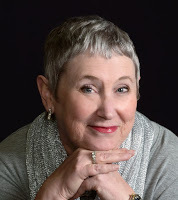 Cathy Fyock is The Business Book Strategist, and works with professionals and thought leaders who want to write a book as a business development strategy. Since starting her business as a book coach in 2014, she has helped more than 160 professionals become published authors. Her most recent book is The Speaker Author: Sell More Books and Book More Speeches. She can be reached at cathy@cathyfyock.com or 502-445-6539.
Cathy Fyock is The Business Book Strategist, and works with professionals and thought leaders who want to write a book as a business development strategy. Since starting her business as a book coach in 2014, she has helped more than 160 professionals become published authors. Her most recent book is The Speaker Author: Sell More Books and Book More Speeches. She can be reached at cathy@cathyfyock.com or 502-445-6539.
Published on June 26, 2020 22:00




